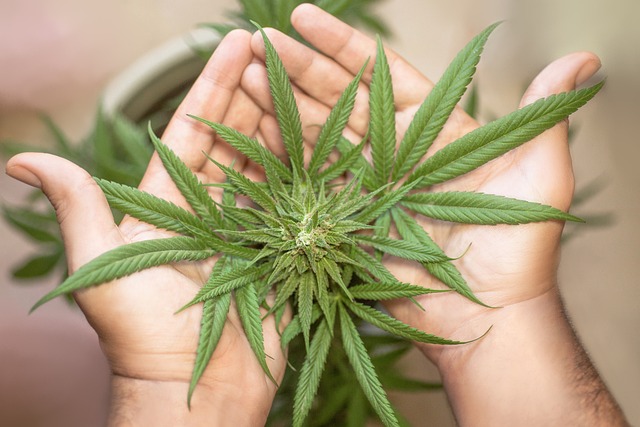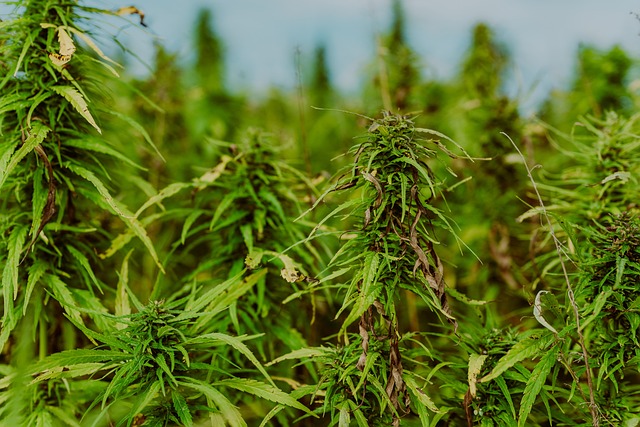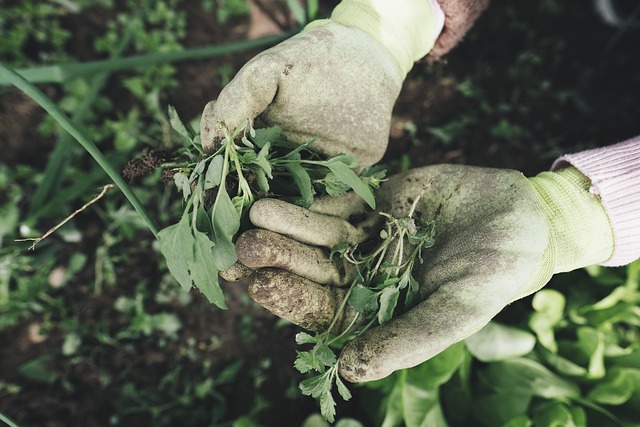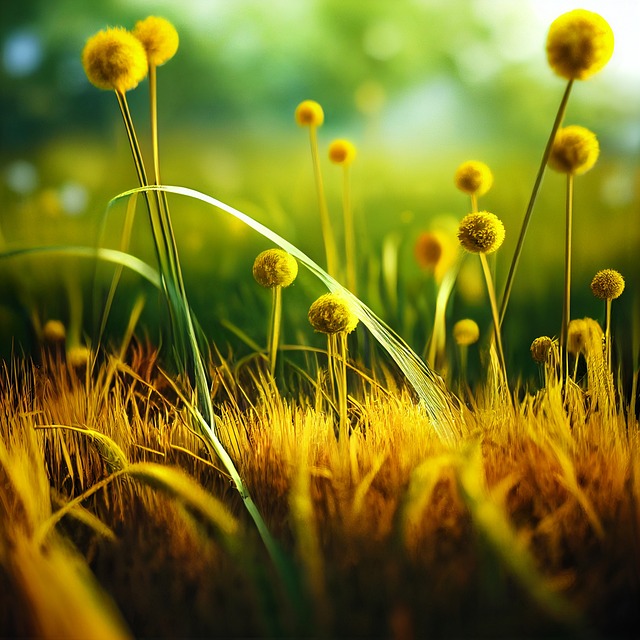In New Hampshire, THCA (tetrahydrocannabinolic acid), a non-psychoactive cannabinoid found in cannabis, has gained attention for its anti-inflammatory and neuroprotective properties. Its legal status allows it to be accessed through the state's medical cannabis program, with recreational use of THCA flower being ambiguous due to its precursor relationship with THC. The state's progressive stance on cannabis, with both medical and recreational use now legal, has positioned THCA as a therapeutic alternative, particularly for conditions like chronic pain, inflammation, nausea, and anxiety. Interest in THCA is also driven by its potential health benefits, which are currently being explored through research. The cultivation of THCA-rich flowers is regulated under state laws that align with the Farm Bill, necessitating adherence to strict cultivation standards and post-harvest handling to maintain high THCA levels. As legislative debates continue, there's a growing anticipation for the full legalization of THCA flower in New Hampshire, which could significantly impact the state's economy and cannabis market, with analysts predicting an expansion and economic growth if this becomes reality.
Explore the intricate world of THCA flower, a non-psychoactive cannabinoid gaining prominence for its potential health benefits and therapeutic properties. As New Hampshire’s legal landscape evolves to accommodate this emerging market, understanding its status becomes paramount. This article delves into the legality of THCA flower within the state, offering a comprehensive overview of the current laws governing its use and sale. Discover the cultivation secrets and best practices for local growers, and anticipate future trends that may shape the industry’s trajectory not just in New Hampshire but across the nation. Join us as we unravel the potential impacts and applications of THCA flower, ensuring an informed perspective on this burgeoning botanical interest.
- Understanding THCA Flower and Its Rising Popularity in New Hampshire
- The Legal Landscape of THCA Flower in New Hampshire: A Comprehensive Overview
- Benefits of THCA Flower: Potential Effects and Uses Explored
- Cultivating and Harvesting THCA Flower in New Hampshire: Best Practices for Growers
- The Future of THCA Flower Legality and Market Trends in New Hampshire and Beyond
Understanding THCA Flower and Its Rising Popularity in New Hampshire

The interest in cannabinoids and their effects has led to a spotlight on THCA, or tetrahydrocannabinolic acid, a non-psychoactive precursor to THC found in cannabis plants. As of recent years, THCA flower has garnered significant attention among consumers in New Hampshire due to its unique properties and potential health benefits. Unlike its psychoactive counterpart, Delta-9 THC, THCA is known for its anti-inflammatory and neuroprotective qualities, making it a subject of interest for those seeking the therapeutic effects of cannabis without the high. In New Hampshire, where the legal landscape has been favorable to cannabis products, THCA flower has become a popular choice among both medical and recreational users. The legality of THCA in New Hampshire stems from the state’s comprehensive cannabis laws, which allow for the possession and use of cannabis in various forms, including flower, provided it contains less than 0.3% Delta-9 THC on a dry weight basis, aligning with the federal definition of hemp. This has enabled a thriving market for THCA flower, with local and online dispensaries offering a range of strains rich in THCA, catering to an ever-growing clientele who are keen to explore its potential benefits. As awareness and research on THCA continue to expand, its rising popularity in New Hampshire is a testament to the evolving understanding of cannabis compounds and their diverse effects.
The Legal Landscape of THCA Flower in New Hampshire: A Comprehensive Overview

In recent years, the legal landscape surrounding THCA flower has seen significant evolution in New Hampshire. As of the latest updates, New Hampshire has a progressive stance on cannabis, with laws allowing for the medical and recreational use of certain cannabis products. THCA, or tetrahydrocannabinolic acid, is a non-psychoactive precursor to THC, the primary psychoactive component in cannabis. It is gaining attention for its potential therapeutic benefits and has become a subject of interest for consumers and researchers alike. In the context of New Hampshire’s regulations, THCA flower exists in a nuanced legal framework where its legality hinges on the product’s intended use. For medical patients with a certification, THCA flower is permissible under state law, provided it is obtained from a licensed dispensary. The state has established clear guidelines for the possession, purchase, and use of medical cannabis products, including those containing THCA. On the recreational front, while adult-use cannabis was legalized in New Hampshire, THCA flower’s status remains more defined due to its precursor nature. It is not explicitly included in the recreational legalization, which primarily focused on THC and other cannabinoids. As such, individuals interested in legally purchasing THCA flower for personal use in New Hampshire should ensure they adhere strictly to the medical cannabis program or await further legislative clarification regarding its recreational status. Navigating these laws requires careful attention to detail and staying informed on any changes as the legal environment continues to adapt to the evolving landscape of cannabis products, including THCA flower.
Benefits of THCA Flower: Potential Effects and Uses Explored

THCA, or tetrahydrocannabinolic acid, is a non-psychoactive cannabinoid found in the Cannabis sativa plant, which, when exposed to heat, degrades into the more commonly known THC. The interest in THCA has surged due to its potential therapeutic properties and legal status in certain regions like New Hampshire. Unlike THC, THCA does not induce psychoactive effects, making it a preferred choice for those seeking wellness benefits without mind-altering experiences.
Preliminary research suggests that THCA may offer a range of health benefits, including anti-inflammatory and neuroprotective properties. It is believed to interact with the body’s endocannabinoid system, influencing various physiological processes. Proponents report that THCA flower could potentially alleviate symptoms associated with conditions such as chronic pain, inflammation, nausea, and anxiety without the psychoactive side effects of its counterpart, THC. In New Hampshire, where the use of cannabis products containing THCA is legally permissible under certain conditions, enthusiasts and researchers are exploring the full spectrum of this cannabinoid’s potential effects and uses. The state’s regulatory framework allows for scientific investigation and consumer access to THCA-rich products, contributing to a growing body of anecdotal and clinical evidence that underscores the interest in this naturally occurring compound. As interest and research continue to expand, the understanding of THCA’s benefits and proper usage is becoming more nuanced, reflecting its significance in the evolving landscape of cannabinoid-based therapies.
Cultivating and Harvesting THCA Flower in New Hampshire: Best Practices for Growers

In New Hampshire, the cultivation and harvesting of THCA flower are governed by state regulations that allow for the legal growth of hemp-derived products, including varieties rich in THCA. Growers looking to produce THCA-rich flowers must first ensure they are operating within the bounds of the state’s hemp program. This involves obtaining the necessary licenses and adhering to the cultivation guidelines set forth by both state and federal laws, which include maintaining compliance with the Agricultural Improvement Act of 2018, more commonly known as the Farm Bill.
To successfully cultivate THCA flower in New Hampshire, it is imperative to select a strain that naturally contains high levels of THCA. These strains can be sourced from reputable seed banks or other licensed growers. The growing conditions in New Hampshire’s varied climates necessitate careful attention to the planting schedule, as well as the provision of adequate sunlight, soil nutrients, and moisture to support the healthy development of the plants. Additionally, monitoring for pests and diseases is crucial to prevent crop loss and to maintain the integrity of the THCA content. Harvesting should be timed to capture the peak THCA concentration before it converts to other cannabinoids through the drying and curing process. Proper harvesting techniques involve cutting the flower at the correct stage, drying with controlled humidity to avoid mold, and then curing in a dark, temperature-controlled environment to preserve the THCA content and enhance the overall quality of the flowers. These best practices for growers in New Hampshire will not only ensure legal compliance but also maximize the therapeutic potential of their THCA flower.
The Future of THCA Flower Legality and Market Trends in New Hampshire and Beyond

Navigating the evolving landscape of THCA flower legality, New Hampshire stands as a bellwether for potential shifts at both state and national levels. As of the current understanding, THCA, or Tetrahydrocannabinolic Acid, the non-psychoactive precursor to THC, holds a precarious status within the state’s regulatory framework. In New Hampshire, legislative discussions and public opinion continue to shape the future of cannabis derivatives, with THCA flower being at the forefront due to its unique legal position. Advocates argue that the therapeutic properties of THCA merit further exploration and potential legalization, citing anecdotal evidence and emerging research supporting its benefits. This debate is not isolated to New Hampshire; it mirrors a broader national discourse on cannabis policy, where states like New Hampshire could play a pivotal role in setting precedents for federal legislation.
Market trends suggest that if THCA flower becomes legalized or decriminalized, it could carve out a significant niche within the cannabis industry. Consumer interest in alternative cannabinoids, including THCA, is growing as people seek out new and effective wellness products. This trend is evident in states where THCA products are already accessible, indicating that New Hampshire’s market could expand rapidly if regulatory barriers are lifted. Retailers and producers anticipate a surge in demand for high-quality THCA flower and derivative products should legalization occur, with the potential for substantial economic impact. As the conversation around cannabis reform continues to evolve, stakeholders in New Hampshire and across the country keep a close eye on how these developments will reshape the market and define the role of THCA within the burgeoning cannabis industry.
In recent times, THCA flower has garnered significant attention among consumers and cultivators in New Hampshire, with its potential benefits and growing acceptance within the legal framework. As outlined in this article, understanding THCA flower’s properties, the legal landscape governing its use, and the optimal methods for its cultivation are crucial for those involved in its production and consumption. With New Hampshire carving a path for THCA legality, enthusiasts can anticipate a burgeoning market that promises to expand both locally and nationally. The insights provided here offer a comprehensive look at the current state and future prospects of THCA flower, ensuring that readers are well-informed about this emerging sector within the cannabis industry.
